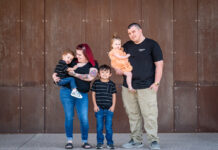
For Maricopa resident Denise Diederich, owning a business is “all consuming.”
“You wake up in the middle of the night with an idea,” she said. “You can’t shut it off. And in some ways you don’t want to.”
The ideas that dance through Diederich’s head and those of her partner, Shari Doramus, are as consuming as the business itself. Or rather, made for consumption.
Diederich and Doramus are fromagiers, the French word for cheese makers. Their business, Rainbow Valley Heritage Foods, began in 2005, but the art of making cheese is in Diederich’s genes — a story that stretches back to the 1940s.
It was a story Diederich didn’t know for most of her life, a tale she was made aware of prior to the business but after learning the craft.
Diederich said she can’t recall how she learned to make cheese.
“It was just something we always did,” she said.
One day about nine years ago while making cheese in the kitchen, Diederich’s grandmother came up and peaked her head over Diederich’s shoulder and asked, “What are you doing, Nora?”
“I kind of back up and give her that funny look because Nora was my great grandmother,” Diederich explained. “And she says, ‘That’s your great grandma’s cheese.’ I said, ‘What are you talking about?’ She says ‘That’s your great grandmother’s cheese. That’s what she used to do.’ And it’s like ‘Oh, so tell me more.’”
That’s when Diederich became familiar with the family history.
Her great grandfather maintained a milk route in Shirley, Ind., a community about 40 miles east of Indianapolis, and sold the route to her grandfather in 1945. She said her grandfather would travel in a truck to small farms, pick up cans of milk and deliver them to a cheese plant in the area.
Sometimes, her grandfather would bring home leftover milk or frozen milk and cream, and her grandmother would skim the cream to make butter and also create a “simple farm cheese.”
Fast-forward years later at the start of the recent economic downturn. Diederich and Doramus had another business at the time, growing cacti and succulents.
“We were at a farmers’ market not selling anything,” she said.
But Diederich and Doramus noticed that food — a necessary commodity — wasn’t having any trouble grabbing money from drying wallets.
“Shari’s like, ‘What would it take to make your cheese?’ And I said, ‘I don’t know, but I’ll find out.’”
A few months later, Diederich and Doramus had acquired a license through the Arizona Department of Agriculture to make and sell dairy products.
Today, the business owners buy pasteurized milk from a large, independent dairy in Yuma and sell their creations to retailers and restaurants in the Phoenix area, in addition to displaying their products at a Tucson farmers’ market.
“We produce a fresh product,” Diederich said. “We make cheese every single week. We don’t make a cheese that can sit on the shelf and age for another six months. It doesn’t work that way with ours.”
Their products — mostly cheese and butter — can be found at Atlas Bistro in Scottsdale, Essence Bakery Café in Tempe, The House at Secret Garden in Phoenix and other Valley restaurants. Diederich said the duo hopes to expand into the Tucson market.
The business’ primary product is farmer’s cheese. Flavors include sun-dried tomato, herb and garlic, spinach with pumpkin seed and roasted chili. Their butter flavors consist of sea salt, honey, Cajun herb, chili lime, maple and smoked butter.
Currently, the two Maricopa residents make up the entire staff of the small business. Diederich focuses on sales and delivery of the products, while Doramus manages the business.
While hopes for the business owners include breaking into the Tucson market and one day hiring other employees, Diederich said the future is unclear.
As producers and distributors of dairy products, the two women are required to make their creations in a commercial kitchen. They currently rent kitchen time from Pig and Pickle restaurant on Hayden Road in Scottsdale — a location that also uses their products. The business owners have used the kitchen the last six months and previously rented time at other commercial kitchens in the Valley.
But the cost of renting space takes a huge chunk out of their finances — about $10,000 to $12,000 a year, Diederich said. The Maricopa residents also have to pay for the drive to and from the Valley.
In addition, making thei





![O’Reilly gears up for second Maricopa location An exterior view of O'Reilly Auto Parts on John Wayne Parkway on May 2, 2024.[Monica D. Spencer]](https://www.inmaricopa.com/wp-content/uploads/2024/05/spencer-050224-oreilly-second-location-web-218x150.jpg)

![Maricopa restaurateur makes Food Network connection [Namkeen Dhaba]](https://www.inmaricopa.com/wp-content/uploads/2024/04/439456716_377105198650519_7536248579664805896_n-218x150.jpg)



![Merging lanes incite more 347 anger A merging lane sign sits on the side of State Route 347 northbound lanes during evening traffic on April 30, 2024. [Monica D. Spencer]](https://www.inmaricopa.com/wp-content/uploads/2024/04/spencer-043024-adot-merging-lanes-347-web-218x150.jpg)




